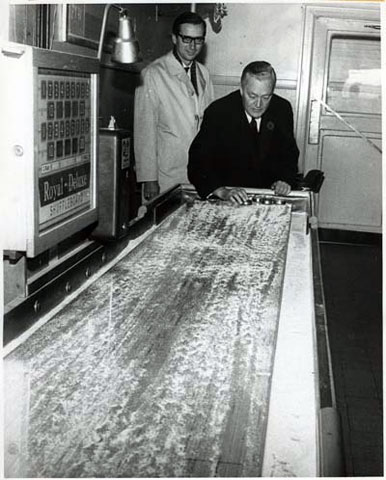Secondary Navigation Menu
Home > Events > The Bottom Line: a Not So Quiet Revolution
The Bottom Line: a Not So Quiet Revolution
Having gone to France in the 1950s, journalist Lise Payette and painter Marcelle Ferron noted that Quebec had changed considerably upon their return a decade later. It was as if new life had been breathed into Quebec within the space of a few years, a phenomenon also observed in most western societies. In the fields of education and health, the Church slowly abandoned its prerogatives to an increasingly interventionist and reformist state. Education and healthcare quickly became available to a greater number of people. From an economic standpoint, Quebec clamoured loud and high that it wanted to be master in its own home and acquired the tools needed to accomplish this. Nationalism, or what Marcel Rioux referred to as the ideology of conservation based exclusively on the survival of the French people, Catholic faith and their language was a thing of the past. The new nationalism was expressed through new references and was more affirmative and demanding. Even the vocabulary changed. Poet Paul Chamberland wrote: "We will use the terms Quebec and Quebecer rather than French Canada and French Canadian. The language bias masks a transformation of realities. Quebec will no longer be a province, but a country [...]" (translation). Finally, culture, long marginalized and underdeveloped, was blooming in the 1960s. Writers, poets, painters, sculptors, filmmakers and singers expressed themselves as never before, unrestrained, and found a larger audience.
In short, all of these changes were part and parcel of the Quiet Revolution, a moment in the history of Quebec where inertia and fear were replaced by boldness and imagination, where confident Quebecers believed in their means. Pierre Bourgault, leader of the Rassemblement pour l'indépendance nationale during the election of 1966, stated "we can do it" (translation). It was during these years that Quebecers discovered themselves, forged feelings of pride and discovered others.
Views and Perceptions of the Quiet Revolution
"[...] The year 1960 marked the end of dogmatic clericalism, despotic politics and traditional nationalism. But above all, it marked the entry of Quebec into modernity" (translation).
Léon Dion, La Révolution déroutée, 1960-1976, Montréal, Boréal, 1998, p. 37.
"By and large, with the Quiet Revolution, we completed a phase of our historic development. It placed us in the presence of social practices and renewed our collective poetics. An adjustment, so to speak, but no cause for shame" (translation).
Fernand Dumont, Raisons communes, Montréal, Boréal, 1995, p. 25.
"The Quiet Revolution was neither programmed nor organized over a long period, nor were its exact results foreseeable. It consisted of a series of decisions, actions and symbols commanded by the problems of the times and for which circumstances were amenable. It was the result of considerable and rapid changes affecting all aspects of community life in Quebec and all social classes" (translation).
Yves Martin, quoted in Jacques Lacoursière, Histoire populaire du Québec, Tome V: 1960 to 1970, Sillery, Septentrion, 2008, p. 439-440.
"[...] I must view the Quiet Revolution for what it was: an exceptional mutation, apparently the result of improbable chance, but in reality created somewhat mysteriously, patiently cloaked in a long, obscure and fragile interval of time... fragile and indestructible, like hope" (translation).
(Guy Frégault, quoted by Denis Vaugeois, « La culture, point de départ? », in Jacques Lacoursière, Histoire populaire du Québec, Tome V: 1960 to 1970, Sillery, Septentrion, 2008, p. 32.
"The Quiet Revolution seemed more like an abrupt unblocking of a society rather than a veritable revolution.' [206]. [...] early signs first came from the intellectual community, and the artists more precisely" (translation).
Jean-Claude Robert, Du Canada français au Québec libre. Histoire d'un mouvement indépendantiste, Paris Flammarion, 1975, p. 206-207.
"The Quiet Revolution was also about the masses taking the floor. They had never before expressed themselves, having had the clergy and the liberal professions as their spokespersons. As of 1960, the 'quiet possession of the truth,' which Mr. Lesage himself said characterized the population of Quebec, was fiercely challenged by the new elite" (Translation)
Marcel Rioux, La question du Québec, Montréal, Parti Pris, 1976, 104.
"It is this rejection of the dominant old ideology [that of an essentially rural and agrarian society and traditionalism) that best describes the Quiet Revolution and conveys it exceptional character" (translation).
Kenneth McRoberts and Dale Posgate, Développement et modernisation du Québec, Montréal, Boréal Express, 1983, p. 116.



